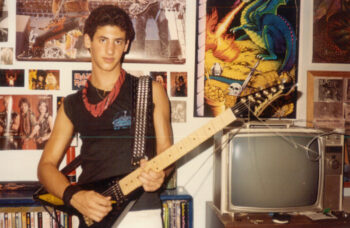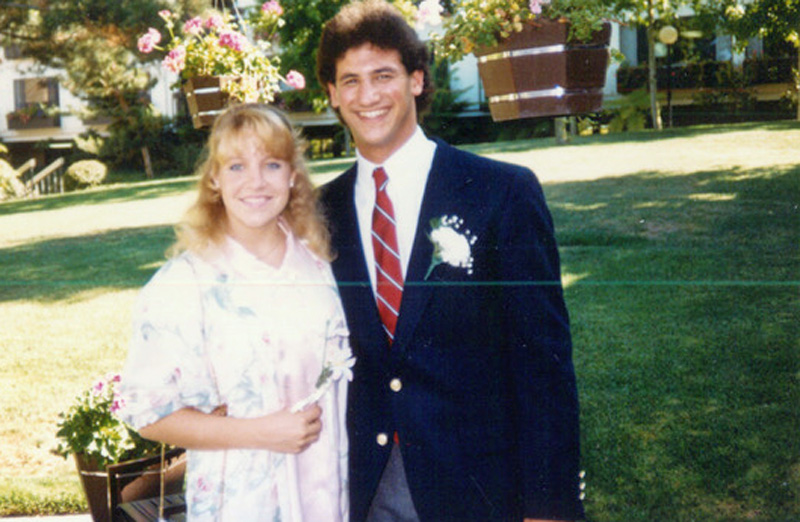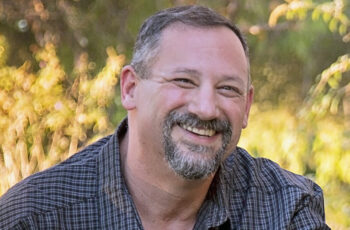By Mark Ellis –
Dave Brodsky grew up in what was fondly referred to as the faculty “ghetto” at Stanford

University. The son of a physics professor at Stanford’s Linear Accelerator Center, he rubbed shoulders with the children of an elite group of professors, researchers and medical professionals.
“It was fairly atheistic and agnostic, even though we had people from Muslim and Buddhist backgrounds, Gentile and Jewish,” Dave recounts.
His Jewish family fled Vienna in 1939 as Hitler’s maniacal power grab plunged Europe into the nightmare of World War II. Family members left behind were rounded up and sent to concentration camps where they died except one aunt who survived to see her camp liberated.
Dave’s mother impressed on her children their Jewish identity. “It was important for her and us to know there were people who wanted to kill us for our faith,” he says.
“We didn’t want anything to do with Jesus because it was Christians who killed Jews. I didn’t know anything about Christianity growing up and didn’t want to know. It was a bad thing to know.”
One day he noticed a billboard that announced, “I found it,” and wondered what people had found. Shortly after that he saw a “Jews for Jesus” bumper sticker. “All I knew is that we really didn’t like the people in that car, but not to ask anything more about it. Those are traitorous people,” he thought.
When he was eight-years-old his family traveled through Germany and his parents made a point of taking Dave and his brother Steve to see Dachau, the Nazi concentration camp that held political prisoners, Poles, Jews, homosexuals, Jehovah’s Witnesses, Christian pastors and priests that opposed Hitler, Communists, and Roma people. More than 40,000 were killed there or died due to brutal treatment, according to Dachau’s website.
Brodsky walked away with terrible memories etched into his mind about the medical experiments performed on prisoners and other atrocities. “It started me thinking about death more than you want kids to think about death in a concrete way,” he says.
Two years later his parents took him to see Masada, the mountaintop refuge in Israel that became the last stand of a Jewish rebellion against Rome after Jerusalem fell in 70 AD. It was also a place where 960 men, women, and children committed suicide en masse on April 16, 73 AD, 40 years after the death of Jesus (nearly to the day).
Suicide and death became a potent cocktail for rumination in Brodsky’s youthful, impressionistic mind.
“That same year my grandmother was struck by a car as a pedestrian crossing the road and killed in Minnesota,” he recounts. He was told the family needed to fly immediately to Minnesota for her burial, because Jewish people don’t believe in embalming.
Everything about a Jewish burial had to be natural, with the coffin made of wood, even the nails made with wood plugs. “Everything has to be able to decay to hold to this one Scripture, “ashes to ashes and dust to dust.”
Following tradition, young Dave threw a shovel of dirt on his grandmother’s grave. “My mom was sobbing that the only person who ever loved her has died.”
He was so confused. Don’t I love her? Doesn’t my dad love her?” he thought.
“My mom never completely recovered from her mom’s death. It started the end of my parents’ marriage. Dad moved out when I was 14 and they officially divorced when I was 18, at the end of my senior year of high school.”
“My mom had to go to work. She was filled with self-pity about the loss of her mom and the divorce.”
After his father moved out, and his mother and brother got jobs, Brodsky found himself largely alone at age 14, with time on his hands. “By the time I got to high school I was getting very sick of performance and academics and achievement. My brother was valedictorian of Hebrew school class and I was too. He did the maximum so I did too. There were piano lessons. I spend all my time performing, performing, performing…”
“I didn’t want to be around any of them. I got away from piano, but stuck with music, which became rock music. I had a proficiency for playing guitar and started playing in rock bands.”
Drawn to the heavy metal movement, his idols became bands like The Scorpions, Iron Maiden, AC DC, Van Halen, and Motley Crue. “Music didn’t make me happy, but it was helping me avoid my pain.”
He began to mimic the attire of heavy metal rockers. “I wore a razor blade around my neck and a skull earring in my left ear. He made his own tee shirts with pentagrams and upside down crosses.
Remarkably, he wasn’t drawn into the drug culture surrounding the music. “I didn’t believe in the satanic things in the music. I didn’t believe in anything,” he recalls.
His high school years became a long spiral downward. “I went from enjoying things and escaping things into getting really depressed and looking for a reason to be alive.
“By my senior year of high school I began to think about suicide every day. It was a battle every day.”
What am I living for? he wondered. When am I going to find some hope and some joy that makes it worth bearing all the pain?
As he pondered ending his life, he thought about Hamlet’s famous soliloquy, which centered on Hamlet’s musings about suicide. “Hamlet decides not to kill himself because he doesn’t know what’s on the other side and it could be even worse.”
In the midst of his despair, God did something remarkable. He sent a rescuer into Dave’s life, a young Christian woman named Kim, an ardent follower of Jesus.
“I didn’t know why she was nice to me,” he recalls. “I knew after we spent a little time together that there was something very different about her. But I didn’t know what it was. There was an attractiveness about her person. She was a life-giving person. She lit up the room when she walked in. I suddenly liked being around her. It was confusing because I wasn’t trying to date her. There was instant friendship.”
Kim’s group of preppy friends told her not to spend time with Dave, because he looked dangerous.
“What do you think?” he asked her. “Do you think I’m dangerous?”
She laughed. “I think it’s pretty funny because I don’t think you’re dangerous.”
One night Dave was home alone. His brother was off at college. “I went for a walk and I decided that I could no longer stand the pain of life. When I got home I was going to kill myself.”
But when he arrived at home, Kim was inexplicably waiting in his driveway. “She was just there. It was probably 11 pm.”
He didn’t know what she was doing there, but God knew.
“Kim, I need to say goodbye,” he told her immediately.
“I just got here,” she said.
“No, not that kind of goodbye. I need to say goodbye to you.”
Kim sensed the urgency of the moment. “Dave, can I tell you what I live for?”
He knew she was going to tell him about Jesus, but he thought it would be rude to tell his friend he would rather be dead than hear what she believed. He knew her Christianity was based on myths and lies. How can that hurt me? he thought.
“OK, I’ll listen,” he told her.
They crossed the street away from his house, so his mother wouldn’t overhear them and sat down under a streetlight.
“A 17-year-old girl began explaining the gospel to an 18-year-old boy. For the first time in my life I had the humility to listen, to hear how God was the sacrifice for our sins. He was the Messiah the Jewish people had been waiting for. He was the propitiation and he would redeem us. He was the suffering servant from Isaiah 53.”
Ironically, things she told him connected with his background in Hebrew School. “I felt fireworks were going off inside my head. Things made sense in a way that had never made sense. Things I learned from kindergarten on up that I forgot came to light in my mind.”
He peppered her with questions. “Why would there only be one way to God? Why would God send people to hell?”
The Holy Spirit gave Kim the words she needed in the moment.
They talked until 2 or 3 in the morning and then Dave said, “OK, Kim I’m so tired, I can’t think clearly anymore. I will make you a promise. I will not kill myself before we talk again. Why don’t you go home and I’ll go home and we’ll talk more. I need to rest and think about this.”
They talked on the phone the following day, a Saturday, and Dave began to process all he heard.
On Sunday night, Dave recognized some astounding truths:
“I realized that Satan was real and he was the one who wanted me to die because I was separated from God by my sins. He wanted me to die separated from God. Jesus Christ is the Messiah and he was a Savior and I want him to be my Savior. He is the only one who can save me.
“Save me, Lord save me!” he cried.
He saw Kim at school the next day. “I thought she knew I believed, and she didn’t know and was so excited.
Kim gave Dave her Bible and he started reading the New Testament for the first time. “I read the Gospel of Matthew and I was blown away. Then I read Mark and thought this is amazing. Everything grabbed me.”

He couldn’t shut up about Jesus, talking to everyone, including the guys in the bands.
Ten days after he first believed, he gave a gospel presentation to his entire drama class. “There were a whole bunch of astonished people in the room,” he laughs.
He Xeroxed the entire book of Hebrews and told his brother to read it.
After a heavy involvement with Campus Crusade for Christ (CRU) in college and post-college, which involved ministry in Eastern Europe, he formed The Global Mission aka The Chanje Movement, with a principal focus on bringing transformation and revival to the children of Haiti.
Because of his background, he also continues to minister in Israel, Eastern Europe and Mexico.

“A lot of places we work are not easy, but that doesn’t mean they are not life changing. People are eternal and therefore touching a life is making an eternal difference.”
If you want to know more about a personal relationship with God, go here
To learn more about The Global Mission go here




There’s not a shred of historical evidence that a jewish man-god ever existed.
Comments are closed.